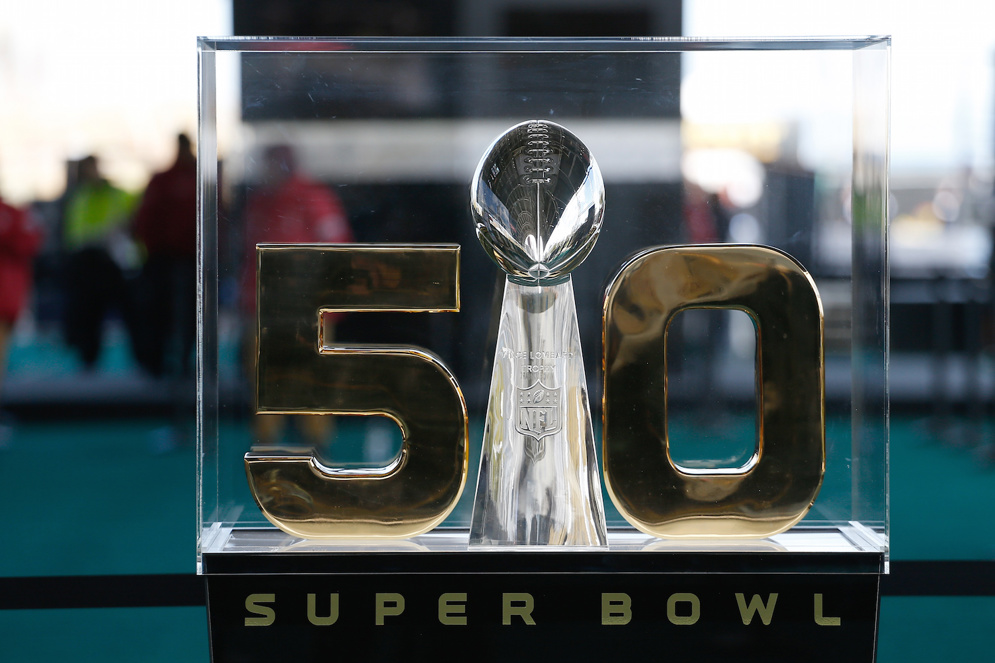The NFL on TV in 2015
This year, as in every year since the Harris Poll began asking about it in 1985, Americans who follow at least one sport say that pro football is their favorite — and television has played a key role in building the NFL’s popularity.
NFL games attracted more than 202 million viewers last season and continue to top the television ratings. In 2014, games on the league’s broadcast partners (CBS, Fox and NBC) averaged 19.2 million viewers — 159 percent higher than the average prime-time viewership (7.4 million) on the four major networks — ABC, CBS, Fox and NBC.
Television has helped elevate the Super Bowl from sporting event to de facto national holiday: Super Bowl XLIX, on Feb. 1, 2015, averaged 114.4 million viewers, making it the most-watched program in U.S. television history.
NBC’s “Sunday Night Football” averaged 21.3 million viewers in 2014 and has been prime time’s top-rated show for the full September-May TV season for four consecutive years — a first for a sports series.
A look ahead
Here are some of the highlights of the 2015 NFL broadcasting schedule:
- The annual prime-time Kickoff game features the New England Patriots, the defending Super Bowl champion, hosting the Pittsburgh Steelers (Thursday, Sept. 10, on NBC at 8:30 p.m. ET).
- The season’s first double-header on CBS includes the Baltimore Ravens at the Denver Broncos (Sunday, Sept. 13, at 4:25 p.m. ET).
- An NFC East showdown opens NBC’s “Sunday Night Football” season, when the New York Giants visit the Dallas Cowboys (Sunday, Sept. 13, at 8:30 p.m. ET).
- ESPN’s “Monday Night Football” starts with a double-header: the Philadelphia Eagles at the Atlanta Falcons, followed by the Minnesota Vikings at the San Francisco 49ers (Monday, Sept. 14, at 7:10 p.m. and 10:20 p.m. ET).
- As the Super Bowl approaches its 50th anniversary, this season offers 19 rematches between opponents in previous Super Bowls.
- ESPN will broadcast a “Monday Night Football” game each week from week 2 through week 16. (There will be no Monday night game in week 17 to provide flexibility in scheduling the opening weekend of the NFL playoffs.)
- Games will be “cross-flexed” between CBS and Fox for the second consecutive season to allow more games to be seen by more fans. NFC matchups that will move from Fox to CBS, and AFC matchups that will go the other way, include the Chicago Bears at the Seattle Seahawks in week 3 and the Carolina Panthers at Dallas on Thanksgiving Day. Additional “cross-flexed” games will be determined during the season.
- Sixteen divisional matchups are scheduled for the final weekend of the season, increasing the chance that more games will have playoff implications (Sunday, Jan. 3).
- The Pro Bowl’s return to Hawaii will be televised from Aloha Stadium on ESPN (Sunday, Jan. 31).
- Super Bowl 50 at Levi’s Stadium in Santa Clara, California, airs on CBS on Sunday, Feb. 7.
SUPER BOWL IS ON THE FIFTY

The NFL is celebrating its premier event with “Super Bowl on the Fifty,” honoring the prestige and the history of the championship game, leading up to Super Bowl 50 on Sunday, Feb. 7, at Levi’s Stadium in Santa Clara, California.
CBS will televise Super Bowl 50 — its 19th Super Bowl broadcast, the most by any network.
“CBS Sports is proud to have made history televising Super Bowl I, and we are poised to do it again with the broadcast of Super Bowl 50,” says Sean McManus, chairman of CBS Sports. “This is a special season for CBS Sports, with more NFL coverage than ever before, including ‘Thursday Night Football,’ Sunday afternoon football, the AFC playoffs — and culminating with the biggest event in television history, Super Bowl 50.”
FLEXIBLE SCHEDULING
To make sure the best matchups at the end of the season are broadcast to the largest audiences, the NFL introduced “flexible scheduling” in 2006. This involves moving a game from its scheduled Sunday afternoon slot on CBS or Fox to the prime-time hours of NBC’s “Sunday Night Football.”
The NFL consults with CBS, Fox and NBC to determine which games will be flexed, and the league reserves the right to move the start times of Sunday games as long as it provides the teams affected and ticket-holding fans with 12 days’ notice. In week 17, the league can flex a game with playoff implications with only six days’ notice.
In week 17 of the 2014 season, the game between the Cincinnati Bengals and the Pittsburgh Steelers, which had playoff implications, was moved from Sunday afternoon on CBS to Sunday night on NBC.
From 2006 through 2013, only games scheduled in weeks 10–15 and week 17 could be “flexed.” In 2014, the league extended flex scheduling to include games starting in week 5. Between weeks 5 and 10, only a total of two games can be flexed, while no restrictions apply from week 11 on.
Flex scheduling does not apply to Thursday, Monday or the occasional Saturday games. The NFL always has had the ability to move Sunday afternoon games between the 1:05 p.m. ET and the 4:05 p.m. ET or 4:25 p.m. ET time slots.
In 2014 the league introduced “cross-flexing,” which allows up to seven games annually that would have typically aired on Fox or CBS to be aired on the other network. That means, for example, that an all-AFC matchup could air on Fox and an all-NFC game could appear on CBS. An equal number of games must be cross-flexed: If CBS airs three games originally slated for Fox, then Fox would have to get three games that would have originally aired on CBS.
